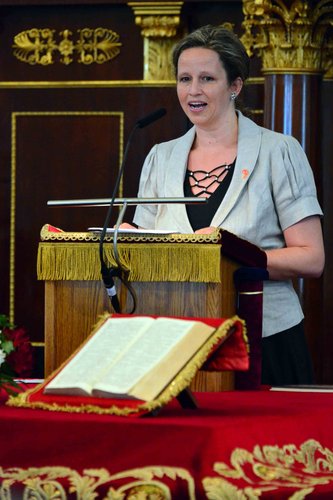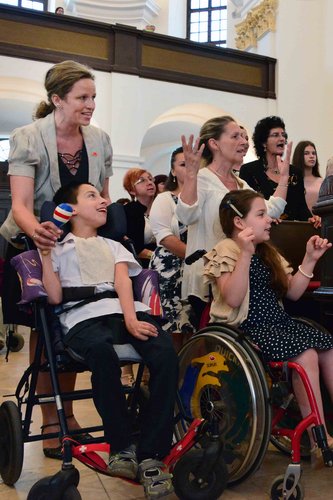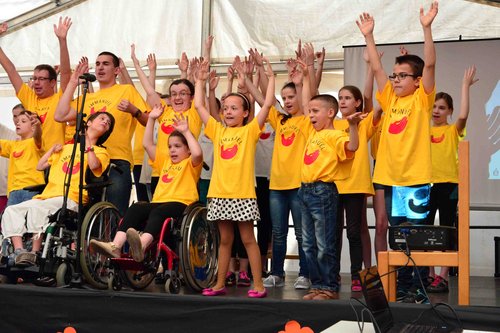They’re Not From Mars
2016. december 13., keddA statement regarding the acceptance of our disabled brothers and sisters in the church was adopted at the recent November Synod meeting. The statement was prepared by experts from the Transtibiscan region and it was suggested that institutions and congregations should implement it in their missions. Coinciding with the International Day of Persons with Disabilities, the RCH talked to Ms. Zsófia Győri, Director of the Immanuel House of the Reformed Great Church in Debrecen.
 What was the main idea behind the creation of this document? Why did you find it important to recommend it for acceptance by the Synod?
What was the main idea behind the creation of this document? Why did you find it important to recommend it for acceptance by the Synod?
The major task of the Immanuel House is to provide complex, high standard service for children with disabilities. In addition to this, we have a voluntary mission as well: we aim at changing the perception of disabled people in society. In our view, this task has to be started in our own community. We find it very important that our own congregations will be receptive to this work. It is our strong conviction that receptiveness benefits every congregation. We are primarily concerned with disabled people, but it concerns not only them, but every marginalized person.
Were the collective experiences of the 25 year old institution also implemented in this statement?
Yes, we took part in the preparation of the statement. Some of us talked about the Hungarian situation in which people with disabilities feel themselves outcasts and how this reflects on our church as well. As one of the parents indicated once, disabled children can feel at a very young age that they are handled as if they are coming from Mars. They and their whole family are “weird and things to be avoided.” It is not okay. Why should these people be outcasts? The strength of a society is its diversity and different values. The main idea behind the document is the need for a receptive attitude in our congregations. The community could be much more valuable in this way. We examined these ideas from a technical point of view, how we can help, what kind of tasks must be completed in the field of accessibility.
Several terms exist beside the term “disabled person”. Which is the official, appropriate term?
Disabled person is the common term, but there is no consensus about the definition. The expression “people living with disabilities” is not accepted by disabled people as they indicate they are not living with their disabilities but are technically living with their spouse, for example. Some people use the term “injured” but others do not accept that one because it speaks to a biological injury only. “Disability” is always a deficit-based expression which emphasizes deficiency. Sometimes they are called “indisposed,” a term which is the most acceptable for experts but one that has not been widely spread in Hungary. This expression shows the fact that a disability is not his or her social problem. It expresses that the obstructions must be handled not only by him or her but that we all have tasks regarding accessibility. We usually think of stairs, ramps, elevators in connection with accessibility but it means much more. Physical accessibility must be preceded by mental accessibility. We have to get rid of the obstacles in our mind that separate us from disabled people. Why does a family rearing a disabled child, a visually or auditory impaired person for example, not come to church, for example? It might be more painful to realize that the real reasons go beyond than the absence of ramps or special equipment, so we have to work on this issue.
Pötyi and Pille – A Fairytale About Real Friendship
On 28 November the students of the Immanuel House and School, the Kölcsey Ferenc Reformed Elementary School, and the Kinizsi Pál Elementary School presented a play titled Pötyi and Pille in Debrecen.
The story of Pötyi and Pille is about true friendship, acceptance, and unconditional love. It shows that there are no obstacles which can not be broken through. The fairytale contains attributes and thoughts which represent the real message of the International Day of Persons with Disabilities – and all of these are told in language that children can easily understand.
It is a wonderful tale about diversity and acceptance which comes to life on stage. Healthy and disabled children perform it together. They help each other while they are having fun and they destroy the invisible walls built among people. However, there is no place for these walls in the world of adults either. We are all humans; we just received different things form God.
Why did the editors think that a commentary should be written for the statement?
The whole statement is based on the fact that we are equal before God. It draws our attention to the fact that Christ was the first one who made things accessible. He broke through the obstacles that existed between humans, and between God and humans. As we have accessibility to God, we have to provide the same for disabled people, so that they have the same opportunity. For this reason, we have to study their specific needs.
 Could you give some examples?
Could you give some examples?
We know that the behavior of disabled people does not always fit societal norms. Could we tolerate that in our congregations? Could we accept that an autistic person may sit in the spot where our family has traditionally sat for hundreds of years? We can help them by handing out bullitens of the liturgy so they can know what is happening and will not be surprised by things. A mentally disabled person can be actively helped with pictures which can help them to understand the message of the sermon. At the very least, congregations can refrain from mocking them if they say the Lord’s Prayer louder or if they live out their faith in a more visible or physically responsive way. In church activities, we can talk to children about why disabled children are different. For a visually impaired person it is a great help if there is a Braille Bible in the congregation and for an auditory impaired person it is important to have somebody who can use sign language. The most important thing is that the disabled person and their family do not feel like outcasts when they come to church. The recently accepted statement is about this topic and its Biblical support.
Have you considered collecting technical advice on this topic?
There is a brochure which summarizes what we should know about the presence of disabled people. Dare to talk about life with a blind person and do not be afraid that this is embarrassing for him. If it is embarrassing, they will tell you. They can accept the situation more naturally and we should learn from them. It is nice to see how children handle the situation. A child from second grade asked a child in our institute why he is sitting in a wheelchair, and he answered, “Because I cannot stand up”. Adults are very sophisticated so they would not ask a question like that, but it would be better if we turned to these people more naturally. If we do not know how to help a blind person, then we should ask them whether we can help and how we can help. Many people say, “I do not even know how I should help, so I just do not help at all.” There are examples for programs sensitizing churches where they are connected with experts to prepare them, which is a good concept. Gaining knowledge about how a person should relate to disability is obviously important, but this knowledge must be empirical as well. That is our responsibility and mission towards the congregation.
What has been your experience in congregations regarding disability?
During the renovation of a church, I asked a pastor whether he employed an engineer specialized for accessibility? “Why would I?” he answered. “If there are not three strong men in a congregation who can help the disabled person to come in then that congregation is worth nothing.” On the one hand, he is right. But I think that if he were in that situation then he would not want to look around for three strong, but he would want to go inside on his own. It is very important that disabled people do not require others in every aspect of life. They have the right to enjoy the same things as others and do things on their own. I often see that Christian altruism is the main obstacle to realize the obstructions of disabled people.

This mentality is typical on the national level as well.
In connection with disabled people, we often think that they need caring, help and pity. We do not think of a partnership in which we receive as much as we give. We are never concerned whether it is good for them to always to receive and never have the chance to give back as well. In our daily operation of the institution, these steps are very important. Our choir serves in homes for elderly people and we used to bake for homeless people. Therefore, we can provide the healthy balance in their lives, once they get something then they can give as well.
Sensitizing movement
A sensitizing movement was organized by the Hungarian Reformed Church Aid on December 2 at the Vörsömarty Square Christmas Market. On the occasion of the International Day of Persons with Disabilities about 300 disabled people and their accompanying friends and family arrived at the square. Together with volunteers, they shared gifts and tea and they also helped to sell products to visitors at the Christmas Market. The disabled people also performed a dance to one of the songs by the Hungarian band Vad Fruttik.
In ten years, what would you like to see regarding the situation of disabled people?
Some students of our practicing school who participated in programs with us have come back as special needs teachers. They tell us that they remember our meetings as a good experience. I believe if we let our children to be together with disabled children – without any specific preparation or agenda – then their attitude to disabled children will be good. A lot of interactions are needed in young age and these processes must be helped along. Inclusive education and integration have large significance. I think those who had such an experience in their childhood will not be dismissive towards disabled people that they encounter in life. As a teacher, they will not refuse to enroll a disabled child. I hope that they will be open and receptive so that the disabled children can be integrated as well. I believe that people can be taught by personal experiences. I am glad that we are working with more simulation programs and with programs that make people more sensitive. The teaching of Jesus is that the door of the church has to be open both literally as well as figuratively. There will be a positive change if we all believe that this process depends on us even if it is not part of our work or our family is not involved in it.
Written by Márta Telepóczki
Photos by János Barcza
Translated by Ágnes Kovács
Contact us
Click here if you are interested in twinning.
Reformed Church in Hungary
Address: H-1146 Budapest, Abonyi utca 21.
PO Box: 1140 Budapest 70, Pf. 5
Email: oikumene@reformatus.hu
English, German and Korean language services in Budapest
Links
Recommended articles
-
Pastoral Letter in the Light of the Pandemic
Bishop Dr. István Szabó sent a pastoral letter of encouragement to the ministers serving in RCH’s congregations, expressing his gratitude for the persistence and creativity of the pastors.
-
RCH Joins in Pope's Call for Prayer
RCH published the call on congregations to join the initiative of Pope Francis, supported by ecumenical organisations, to unite in praying the Lord’s Prayer on Wednesday, 25 March, at noon.
-
English Speaking Worship Services Online
Each Sunday at 11 AM (CET) the St. Columba's Church of Scotland in Budapest, the international community of RCH invites you to join the worpship service on its facebook page.
-
Test of Humanity and Companionship
Reformatus.hu asked Dr. György Velkey, Director General of the Bethesda Children’s Hospital of RCH about the challenges of health care workers and ways of prevention against the pandemic.
-
All Church Events Suspended
In light of the coronavirus the Presidium of RCH requested congregations to suspend all church events with immediate effect. Beside restrictions, it calls for prayer, sobriety and responsibility.











